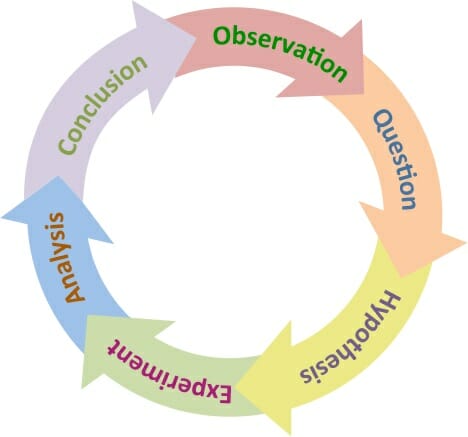SCIENTIFIC INQUIRY AND SCIENTIFIC METHOD
scientific inquiry
We have been looking at the term
"scientific", before numerous words since we were children, and we are
quite familiar with it. So, what exactly does scientific inquiry entail?
Scientific inquiry refers to the various ways in which scientists examine the
natural world and provide interpretations based on the data obtained from their
work, according to what I discovered on the internet.
Scientific inquiry refers to the
blending of conventional science methods with scientific understanding,
critical thinking, and scientific reasoning to produce scientific knowledge.
There are two major purposes of
scientific investigation. For starters, it explains how scientific
investigation is carried out in practice. Second, it explains why scientific
inquiry succeeds in producing true knowledge at the conclusion of the process. Scientific
inquiry goes beyond the acquisition of procedural skills like seeing,
inferring, categorizing, forecasting, measuring, questioning, interpreting, and
analyzing data, which must all happen in the right order for good scientific
inquiry to take place.
Inductive and Deductive Reasoning in Scientific Study
The difference between deductive reasoning and inductive reasoning is, they move in opposite directions, inductive reasoning leads to broad generalizations from individual observations, whereas deductive reasoning leads to particular judgments or predictions from general principles.
Inductive reasoning:- It entails
drawing broad conclusions based on thorough observation and analysis of a huge
number of individual data points. Inductive thinking does not always lead to
accurate generalizations.
Deductive reasoning:- Starts
with a broad concept of law and applies it to a particular situation to
anticipate specific outcomes. A scientist may extrapolate and anticipate
particular findings based on a set of basic principles that will always be
right as long as the general principles they start with are correct. The types
of deductive reasoning are modus tollens, modus ponens and so on.
In descriptive science, inductive
reasoning is most common, while hypothesis-based research uses deductive
reasoning.
SCIENTIFIC METHOD
Our mind is fully
involved with the act of observation, questioning, and seeking solutions
via tests and experiments. Let's take a closer look at this.
The scientific method is a process for experimentation that is used to explore observations
and answer questions. In science, the scientific method is a
mathematical and experimental methodology. It is, more particularly, the method
for constructing and evaluating a scientific hypothesis.
The Scientific Method: Steps and Terms
We've all heard the terms
observation, hypothesis, and experiment at some point in our lives, whether in
school or in college. The steps of the scientific process, on the other hand,
may change from field to field. Chemists, geologists, philosophers, and others
have their own set of stages, but the most common is,
i. Observation: - A statement of knowledge gained through the
sense or through the use of scientific equipment.
ii. Question: - The proposal of the problem that we want to
solve.
iii.
Hypothesis: - Potential answers to the question at hand. (More
like prediction)
iv. Experiment: - An ordered investigation that is intended to prove
or disprove a hypothesis.
v. Analyze: - Comparing the results of the experiment to the
prediction posed by the hypothesis.
vi. Conclusion: - A statement of whether the original hypothesis
was supported or refuted by the observations gathered.
Using the Scientific Method to Solve a Real-World Problem
I'd want to describe a case in
which I used the scientific approach to an issue.
Last week, I used an electric
socket to plug my air purifier to purify the air in my room. Then I
observed that my air purifier was not working. So, I asked myself a few
questions. Is there an issue with the power outlet? or is my air purifier
malfunctioning? So, I formed my hypothesis. If my charger didn’t work in the
same socket then the issue is in the socket. If my charger is working, the
problem is with the air purifier. As a result, I started my experiment by
plugging the charger into the same outlet. Fortunately, the charger worked. I
was able to come to the conclusion that there is nothing wrong with the power
socket after evaluating the facts. The issue stems from the air purifier
itself. Then I phoned the company's customer service, and a repairman came out
and rectified the problem.
This is just one direct example.
When you follow the scientific approach, you will find that solving issues is a
breeze.
SUMMARY
Scientific inquiry encompasses
the many methods through which scientists investigate the natural world and
provide interpretations based on the data gathered. In scientific research,
deductive reasoning is utilized. The scientific method is an experimentation
procedure that is used to investigate observations and find answers to
problems. We can address a wide range of issues in nearly any sector by
employing scientific methods.
"The man of science has learned to believe in justification, not by faith, but by verification."
-Thomas Huxley-




Comments
Post a Comment